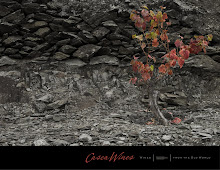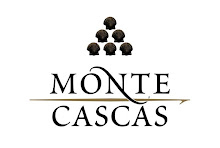Finally! We were, since last year, anxious to vinify these grapes seperatly. This small spot at Soutelo in the Cima Corgo area of the Douro Valley, catched our eyes instantly when we first saw it. Last year unfortunately we couldn't do it seperatly and this year we bougth a small open top to do what we think can be a massive expression of Terroir.
This vineyard owned by one of our producers, Joao, was planted around 70 years ago. In those times producers used a mixture of grape varieties. This is what gives these old vineyard so much charater because in the same plot you have different berries maturations. Meaning that some of the vines maturate first than the vine next to it.
So in the end you have a very rich and complex kind of aromas and tastes. This is why these wines must age some years before they are ready to show all of its wonders.
Wednesday, September 16, 2009
Thursday, September 10, 2009
Douro Superior - Foz Côa Vineyard
 It is impressive how the harvest develops in this land. Our first red grapes came in the winery last week. This vineyard is at the entrance of Foz Côa in Douro Superior area. It has about 60 years of age and is a mixture of varieties.
It is impressive how the harvest develops in this land. Our first red grapes came in the winery last week. This vineyard is at the entrance of Foz Côa in Douro Superior area. It has about 60 years of age and is a mixture of varieties. It is one of the vineyards we blend into our Super Premium range. At this part of Douro the grapes easily give powerful and structured wines. We selected this one because apart from its power it adds complexity to the blend. The enormous mixtures of grape varieties (some of then are not even used nowadays) brings the wine from this origin to a level of fusion of vegetal and fruit aromas, like rock rose mingled in with spices an dark berries.
This year the must is showing so much fruit. The color is being very difficult to come out. 2009 is giving some fight to bring out the color (more time is needed comparing with last year) but the fruit is coming so easily.
That' why we love to be winemakers! You'll never know what you gone get...
Thursday, September 3, 2009
2009 Vintage Pre-Report - Portugal
 Another unusual year. It has been systematic this comment in the last 10 years. I'm starting to believe there's no usual years. 2000 was one of the hottest years, then came 2003 and 2005. 2001, 2004 and 2007 were a fresh years for a southern country of Europe. 2006 was hot as hell in the Summer and then came the rain around the 3rd week of September which didn't stopped for the rest of the harvest. 2002 also rained and diluted most of the wines. 2008 I thought it was the longest harvest ever with steady but very slow maturation. Now comes 2009 with very slow and steady maturation. Until a couple a weeks ago the summer was just warm, windy and dry. The vines got use to this and then were surprised by 2 weeks of usual Summer temperatures for Portugal.
Another unusual year. It has been systematic this comment in the last 10 years. I'm starting to believe there's no usual years. 2000 was one of the hottest years, then came 2003 and 2005. 2001, 2004 and 2007 were a fresh years for a southern country of Europe. 2006 was hot as hell in the Summer and then came the rain around the 3rd week of September which didn't stopped for the rest of the harvest. 2002 also rained and diluted most of the wines. 2008 I thought it was the longest harvest ever with steady but very slow maturation. Now comes 2009 with very slow and steady maturation. Until a couple a weeks ago the summer was just warm, windy and dry. The vines got use to this and then were surprised by 2 weeks of usual Summer temperatures for Portugal.Now the first grapes are in the wineries and we are finding very mature grapes picked very early. In average 10 days of advance compared with 2008, but this is not a rule for all the regions and varieties.
It seems coolest regions will have later harvest and hottest ones are having earlier. Indeed an unusual Crush.
Monday, August 24, 2009
>100 Years old vines

Impressive how vines survive generations. One of our wines is result from the vinification of grapes grown in a plot, surrounded by 3 floors buildings, in Padilha, Almeirim - Tejo region (formerly known as Ribatejo region).
This vineyard cacthed our eyes instantly! Cincinato da Costa wrote in 1900 (et al Portugal Vinicola) that the best sites for Fernão Pires are soils in the transition from "Campo" to "Charneca" where it is found very deep soils. When the surrounding buildings where elevated there were found vine roots at 7 meters. It seems we had found the perfect site for this variety.

2008 vintage is our first wine from this plot. We vinified from this vineyard 5 barrels. The alcoholic fermentation was done in french oak barrels (3rd use) and it aged for 12 months there. This Friday we bottled it.
This sites and vineyards have so much to teach and we are willing to learn. The harvest of the 2009 was on the 11th of August. 13 days earlier than than last year. The fresh 2009 Summer in Portugal helped the vines have a steady maturation. The Tejo region can reach at this time of year temperatures over 40ºC. Without these hot temperatures the vines never stop maturation causing one of the most balanced growning seasons at the Tejo Valley.
Also impressive are the huge troncs of these plants and their height reaching 2 meters without any trelessing system.
Tuesday, August 18, 2009
Lifting grapes
Time to lift the grapes from the sand! This is maybe the most important practice at Colares vineyards. Today our producer at Fontanelas - Colares - decided it was time to lift the bunches from the sand.
The grapes should be lifted after they are big enough to mature and before they begin to get Botrytis. These vineyards are 900m from the Atlantic coast and the wind coming from the North is cold enough to stop the bunch maturation. Not even the palisades of cane are sufficient to protect the grapes from the cold so they must stay lying on the ground to pick its heat. When the bunches are at risk because of the humidity brought by frequent morning fogs, they must be lifted. 

All this makes this wine region unique. But the bunches are not safe yet. As the acidity drops and the sugar inside the berries rise, these grapes get the attention of the surrounding Fauna. The Common Blackbird is the most easily seen. In some vineyards the yields can drop 20-30% only because of these attacks.
Nothing in Colares is easy, not even the wines...
Nothing in Colares is easy, not even the wines...
Monday, August 17, 2009
Colares - Portugal
Colares in Portugal is a micro-region of wines that I have heard more than once being said: "It's the wine that everybody talks and nobody tastes". Well I can agree... This is really one of the smallest wine regions in the world. If you look at the Arenae vineyards they are really rare and extinguishing.
This is why Casca Wines decided to start vinification on this premises. Also, because we are both from nearby town of Cascais. Nowadays there are very few producers of wine in Colares. Only 3 if I'm not mistaken, do transform grapes into wine and we are one of them.
This is why Casca Wines decided to start vinification on this premises. Also, because we are both from nearby town of Cascais. Nowadays there are very few producers of wine in Colares. Only 3 if I'm not mistaken, do transform grapes into wine and we are one of them.
Sunday, August 16, 2009
Subscribe to:
Posts (Atom)




